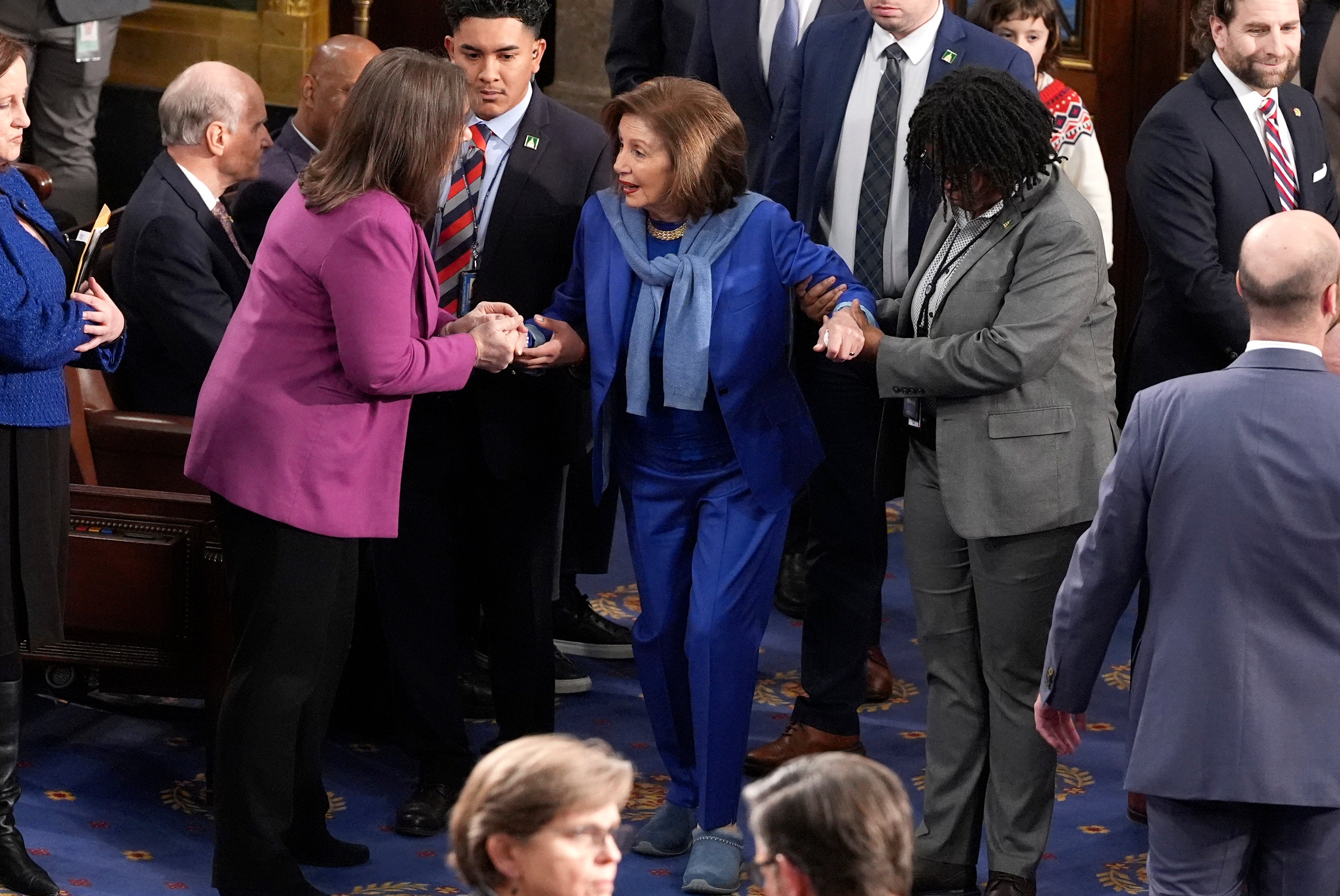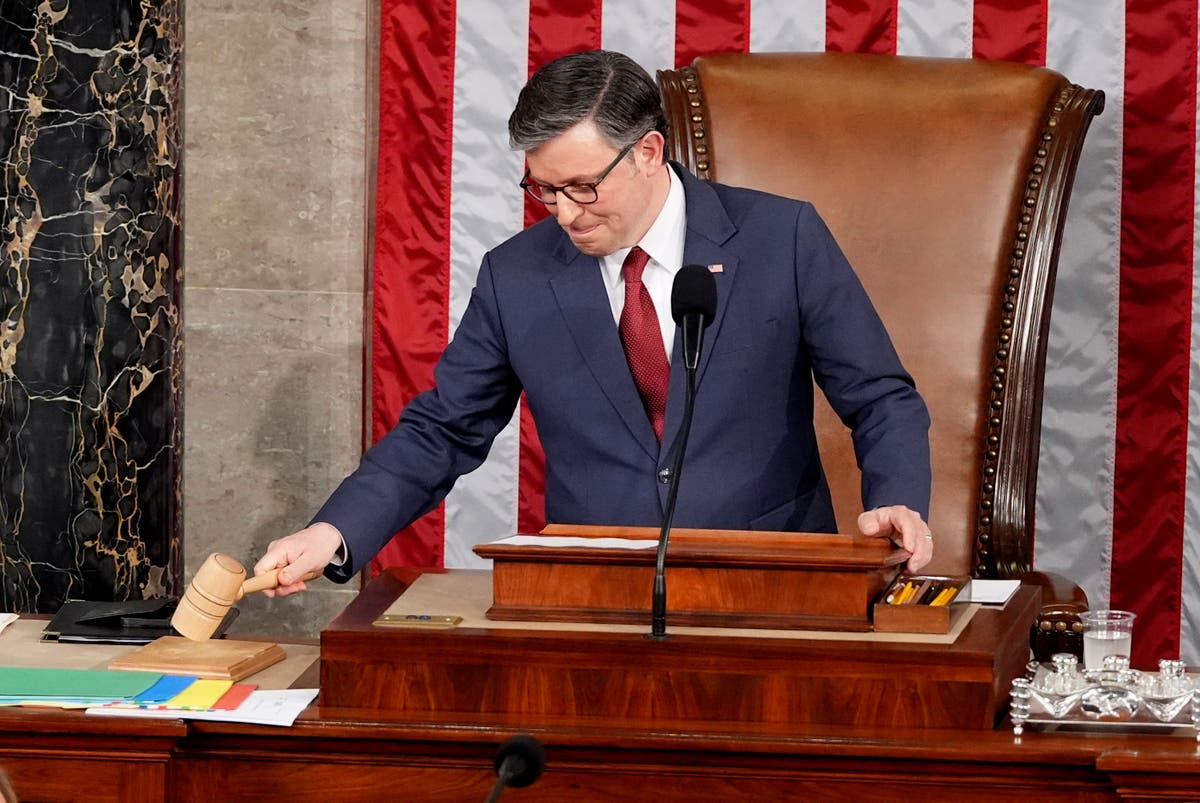Mike Johnson has become speaker of the House after a dramatic delay caused by a handful of insurgent Republicans who revolted against him during the first vote of the 119th Congress.
Johnson ultimately earned the vote of 218 Republicans, the bare minimum needed to win the speaker’s gavel, after discussions with two holdouts — Ralph Norman of South Carolina and Keith Self of Texas — who ended up flipping their votes at the last moment. According to CNN, Trump called both lawmakers while the voting was still open and urged them to throw their weight behind Johnson.
Thomas Massie, the idiosyncratic libertarian Republican from Kentucky, led the opposition against Johnson, voting instead for House Majority Whip Tom Emmer. Norman initially voted for Jim Jordan of Ohio, and Self voted for Byron Donalds of Florida.
While Johnson had plenty of hard-right Republicans on his side, a handful of conservative lawmakers sat out the initial vote, including Chip Roy of Texas, who stood in the middle of the aisle as his name was called and remained silent. Roy ultimately voted for Johnson at the end of the roll call.
At first, it appeared Johnson would have to wait for a second ballot as the House stood still for a nearly 90-minute period, during which he conferred with the recalcitrant members in the GOP cloakroom.
At approximately 2:30 p.m., Norman and Self emerged from the cloakroom and walked to the clerk’s desk at the foot of the speaker’s rostrum.
After a brief exchange, the acting clerk called the House back to order and both members were recorded as changing their votes, giving Johnson the majority and the gavel it confers.

The reversal leading to Johnson’s victory comes after President-elect Donald Trump endorsed Johnson and said he would make calls on Johnson’s behalf in the days leading up to the vote for a speaker, which must be completed before the House can conduct any further business.
Republicans have only 219 seats, a slim majority, meaning a single defection on their side can block their agenda. That number will whittle down in the coming weeks as Republicans like Elise Stefanik of New York and Michael Waltz of Florida leave to join Trump’s administration.
Johnson, a relatively unheralded backbencher, came to power as a compromise candidate after the unprecedented ouster of then-House Speaker Kevin McCarthy in October 2023. At the time, a small group of Republicans banded together with the entire House Democratic Caucus to remove McCarthy from the speakership using a procedural maneuver called a “motion to vacate the chair” after he allowed legislation to avert a government shutdown and fund defense aid to Ukraine to pass the House and become law with President Biden’s signature.

Hardline members of the GOP caucus have frequently railed against successive House speakers from their own party for crafting bipartisan spending legislation that includes provisions favored by Democrats. They have demanded that Johnson — and his predecessors — adhere to an informal guideline called the “Hastert Rule” when deciding whether legislation can be voted on.
That unofficial rule, named for disgraced GOP former speaker Denis Hastert — the wrestling coach turned Illinois congressman who has served prison time for financial crimes related to his effort to buy the silence of a former student who he had molested decades ago — restricts legislation from being voted on unless it has support from the majority of the GOP conference.
Johnson landed in hot water with some in his party by putting forth a compromise bill to avert a government shutdown late last month.
The roughly 1,500-page bill was savaged by right-wingers led by Elon Musk, Trump’s financial benefactor and one of the future heads of his government efficiency advisory group. A number of GOP hardliners were upset that the bill was crafted with input from Democratic leadership, while Musk went on a posting storm against the bill in which he spread numerous false claims about what it included and did not include.
Johnson pulled it from consideration after Trump himself demanded that the stopgap spending bill to keep the government open also lift the country’s statutory debt ceiling so he could blame any resulting spending on the incumbent Biden administration, but a replacement bill doing just that failed to garner enough support from Republicans to pass along party lines.
Johnson, after consulting with House Democratic Leader Hakeem Jeffries and the Senate majority and minority, later put forward a slimmed-down bill that will keep the government running through March.
Ahead of the vote, Johnson insisted he would not engage with horse trading the way that McCarthy did when he pursued the speakership.
“I don’t make deals with anyone,” he told reporters. “There’s no quid pro quo here. I don’t do anything in exchange for a vote other than commit to make this institution work as effectively and efficiently as possible.”
The victory for Johnson sets up Republicans as they also took control of the Senate majority on Friday. Vice President Kamala Harris, who lost to Trump, swore in the new senators.
“It was a good day today,” the Vice President told The Independent.

